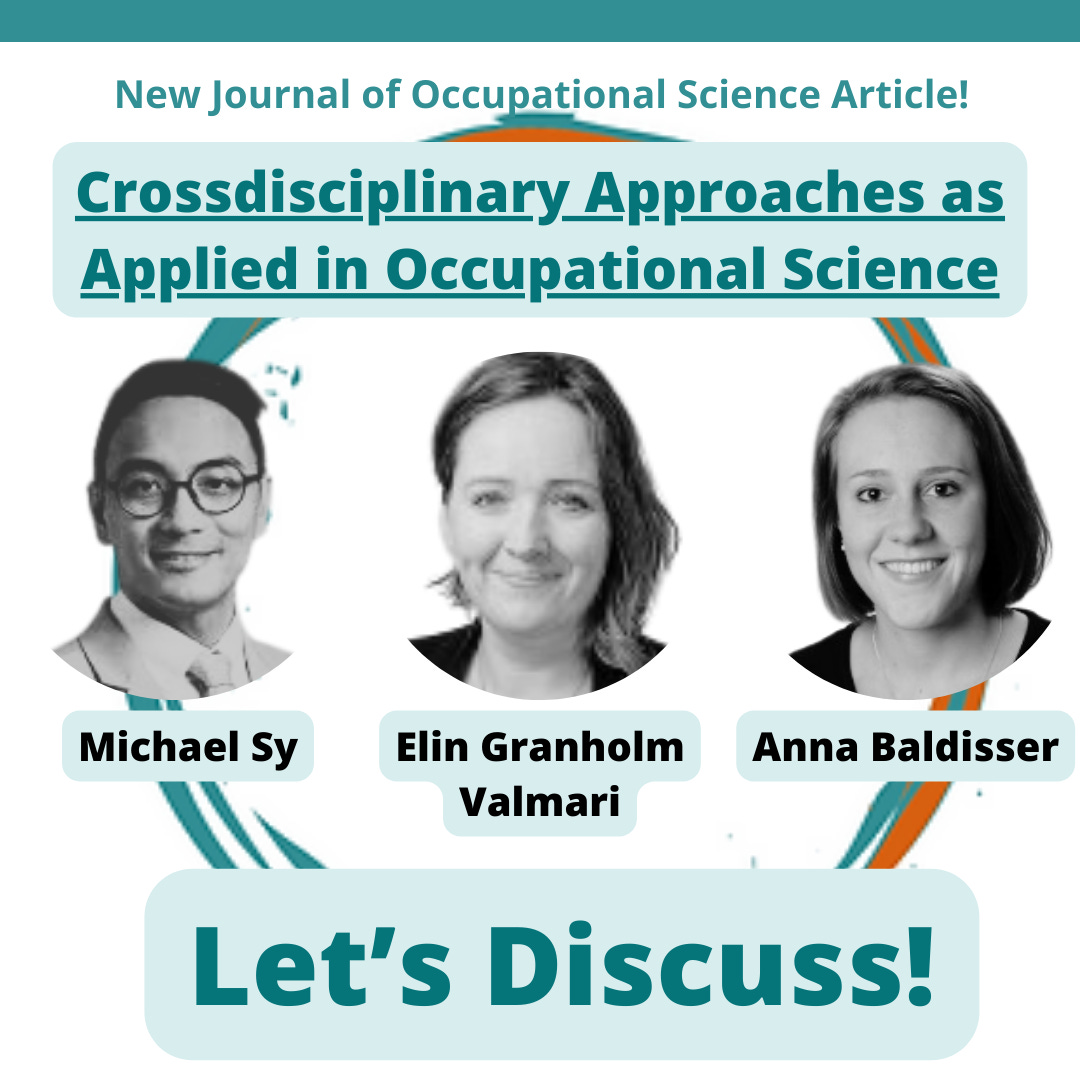Exploring Crossdisciplinary Inquiry in Occupational Science: Join the Discussion with ISOS!
New Open Access Journal of Occupational Science Article! Lets discuss!
One of ISOS’s goals is to facilitate discussion related to Occupational Science from diverse international perspectives.
Each week we will share at least one open-access Occupational Science Article from diverse contexts, hoping to facilitate active discussion over social media.
Today we will start off with one recent article from the Journal of Occupational Science
New Open Access Article from Journal of Occupational Science
e
Direct Link to Open Access Article on JOS: Crossdisciplinary Approaches as Applied in Occupational Science
Article Authors:
https://www.tandfonline.com/doi/full/10.1080/14427591.2024.2367574#d1e244
Article Summary
Exploring Cross-Disciplinary Approaches in Occupational Science
In recent discussions within the realm of occupational science, an interesting exploration has emerged regarding various cross-disciplinary approaches: multi-disciplinary, inter-disciplinary, trans-disciplinary, and post-disciplinary. These frameworks offer diverse perspectives that can deepen our understanding of complex societal issues related to health, well-being, and human behaviour.
A multi-disciplinary approach involves collaboration among experts from different fields who contribute their distinct knowledge while working largely independently. This can enhance the research process by presenting various perspectives side by side, although it may risk compartmentalization of ideas.
In contrast, an inter-disciplinary approach requires a more integrated method where two or more disciplines collaborate to produce synthesized knowledge. This leads to richer insights as teams engage more closely, analyzing and harmonizing concepts.
Moving beyond, a trans-disciplinary approach seeks to bridge the gap between academia and society by involving a broader range of stakeholders, including citizens, in addressing complex problems. This collaborative method aims to create meaningful solutions that resonate with real-world challenges, thus making knowledge more applicable in everyday contexts.
Lastly, the post-disciplinary approach challenges traditional boundaries, advocating for a blending of disciplinary knowledge that allows for innovative and sometimes radical perspectives. This approach embraces decompartmentalization, fostering a more fluid and adaptive way of thinking and creating knowledge.
The exploration of these approaches emphasizes the significance of intentionality in selecting a suitable framework for research in occupational science, allowing researchers to tap into the strengths of each discipline and address occupation-focused research objectives more effectively. As occupational science continues to evolve, engaging with these cross-disciplinary strategies will be crucial in fostering impactful research and practice in the field
Join the Conversation!
We want to hear from you! After diving into the article, consider sharing your thoughts and experiences related to the following discussion prompts:
Exploring Definitions: How do you define multi-disciplinary, inter-disciplinary, trans-disciplinary, and post-disciplinary approaches in your own practice or research? How have these definitions influenced your work in occupational science?
Sharing Experiences: Can you share an experience where a cross-disciplinary approach significantly enhanced your research or patient outcomes? What were the challenges and benefits?
Future Directions: Given the evolving landscape of occupational science, what strategies do you think should be prioritized to effectively integrate cross-disciplinary approaches in future research and practice?
Let’s Collaborate and Share Insights!
Engaging in this discussion will strengthen our professional community and foster deeper understanding. Your insights are invaluable in advancing our practice and improving client outcomes.
Read the article, reflect on the prompts, and join us in the comments below! Together, let’s explore the profound impact of understanding occupation through diverse collaborative lens!
**Disclaimer:**
The information provided in this blog/podcast/video post is intended for general educational purposes only. While we strive for accuracy and clarity, errors or omissions may occur. This content has been partially generated with the assistance of artificial intelligence and has undergone human review to ensure it aligns with the principles of occupational science.
Readers are encouraged to consult qualified professionals for personalized advice tailored to their specific circumstances. Additionally, the opinions expressed here are those of the author and do not necessarily reflect the views of the International Society for Occupational Science (ISOS).
By engaging with this blog/podcast/video, you acknowledge and agree to these terms.



